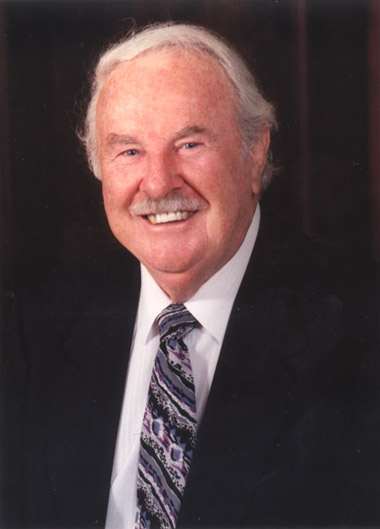George L. Graziadio, Jr.*
Class of 2002
- Chairman Comerica Bank

If education is possible, then good is not enough.
George Graziadio, born in 1919 in Vernon, Connecticut, was the grandson of immigrants. His mother's Irish parents worked in local wool mills. His father's parents came from Italy and worked in New York as fruit peddlers, then moved to Manchester, Connecticut, to run a small grocery store. The Graziadio family lived above the store.
Graziadio's parents instilled in him the duty to help others, especially during the Great Depression when so many were in need. At that time, his grandparents raised chickens, and Graziadio often helped feed them. His father, who worked in real estate and insurance, added auctioneering to his list of jobs to help with finances. Often, Graziadio accompanied his father, occasionally serving as the auctioneer. He also worked as a pinsetter in a bowling alley. As a teenager, he worked in plant nurseries doing weeding and picking strawberries for 2 cents a basket. In the summers, he picked tobacco.
Active in athletics, Graziadio played basketball and baseball in high school. He graduated in 1937 and started college, but he soon grew restless. In 1939, he bought a Model A Ford for $68 and traveled with a friend across the country to California. Their plan was to return to Connecticut in time to start school in the fall. Soon after they arrived in California, however, Graziadio needed an emergency appendectomy. He had only $20 in his pocket when he entered the hospital. Upon his release, he owed $750 in medical expenses. He decided to get a job to work off his debt rather than go home and ask his parents to help him.
Two years later, Graziadio was still working full time in California. World War II broke out, and he applied for the U.S. Air Force but failed the physical because of poor depth perception. Instead, he joined the Flight Test Division of North American Aviation, which built the Mustang fighter aircraft and the B-25 bomber.
During this time, Graziadio joined the Active 20-30 Club, the American arm of an international group called World Council of Young Men's Service Clubs. Ultimately, he took over leadership of the international organization, where he believes he received his "higher education" in business. "As president, I learned how companies should be run, how to raise money, how to involve the public, and how to effectively make a difference in the community," said Graziadio. "I believe we should not procrastinate in our business, social, or family life."
After the war, Graziadio obtained a real estate license and soon progressed from sales to real estate development. He built a house, then a duplex, and then apartments and a few commercial buildings. He later formed a partnership that grew from real estate development to founding Imperial Bank, and he went on to serve as chairman of Comerica Bank of California.
Graziadio's business career taught him much about life. "To me, success is not the destination or the goal," he said. "It's the journey you take and what you learn along the way that are important." Although Graziadio did not go to college, he felt it is very important for young people to pursue higher education. To that end, he established the
George Graziadio School of Business and Management at California's Pepperdine University. "I believe that all of us should give," said Graziadio. "This is where we make a difference. We should give part of what we receive back to those in need. If we all did this, we would accomplish so much. I learned this lesson from my parents during the Depression, and I never forgot it."
Graziadio believed young people need a chance to be heard and that adults need to listen to them. "There is remarkable talent among youth, and they generally have a vision outside of the box," he said. "Those youthful visions will make a better world. They need a chance to explore those visions, and the Horatio Alger Association gives them that chance. I am grateful for the opportunity to be a part of this great organization that lets our youth strive toward making their visions a reality."
